Is it weird to acknowledge that Emperor Palpatine has the most ethically formed army of “bad guys” in Star Wars? It feels weird to say that. I feel strange now. Ick.
I mean, as a Chancellor to the Old Republic, he was responsible for the creation of an army of clones who were deliberately programmed without agency and trained to die for a governed body that they were barred from joining. But as an Emperor, he just plain old recruited. For an academy. Where you became a stormtrooper. So… the Empire was weirdly nicer than the Old Republic or the First Order. The Evil Galactic Empire™ was better at people.
Still feel weird.
Warfare is a given in Star Wars narratives—y’know, with war being in the title and everything—and while we can debate the relative okay-ness of that (in probably another article that contrasts the series with Star Trek? that’s usually how we cite the difference of philosophy…), I keep coming back to how the military standards and practices have evolved over the course of their history. Because when you’re dealing with war, each side informs the other one(s), and there’s a conversation going on in the progression of uniforms, technology, where your soldiers are recruited, and so on. The evolution of faceless militants that the saga provides has a fascinating arc if we track it from the prequels through to the current trilogy.
The Old Republic had no army of its own, of course. Chances are, the Republic expected all worlds within its influence to handle this much in the way that Naboo does during Episode I; the planet is responsible for its own military, its vehicles, and its weaponry. But once Palpatine maneuvers the situation well enough to create an atmosphere of panic, he calls for the creation of an army—one that he has already commissioned in secret with the help of Count Dooku and the Kaminoans. The term “creation” of an army is apt in this case. While the Separatists created an army populated by droids, the Republic receives an army of cloned warriors, based on the template of Jango Fett.
That the Republic’s clone army is a deeply unethical exercise should be obvious to everyone. What’s more baffling is that no one balks at it once Palpatine makes it clear that the Republic army will not be full of droids to counteract the other side. It’s like we’re missing a scene from Attack of the Clones, right after he gets all that applause—
Palpatine: And this army has been cloned for our express use at a state-of-the-art facility on Kamino!
Senate: *sudden confused murmuring*
Palpatine: And they are happy to die for the glory and safety of the Republic because they were engineered to be malleable to our commands, to honor our values, and give themselves over to our cause!
Senate: *crickets*
Palpatine: And they shall have no rights or ability to act as individuals! Their growth was sped up, so they’ll die twice as fast! They are eager to serve!
There should be protesters in front of the Senate building ALL THE TIME from that point on. There should also be propaganda videos assuring Republic denizens that clones are no big deal, and they’re super lucky to have a whole army of them. More people should be upset about this. (You know, like, maybe, Padmé? Isn’t she in the prime position to address this sort of thing?) More people should be freaking out about how a clone army materialized so quickly right when they needed one. Because even if the universe doesn’t know much about cloning, it should be pretty obvious that you can’t churn them out at an assembly line rate. We never see anyone protest these decisions, but we have to assume that they exist somewhere. The Clone Wars cartoon does make a point of Padmé protesting the creation of more soldiers in the middle of the war, stating that she believes it will extend the war effort. But the idea of the clones maybe being actual people seems lost on the general public. With that in mind, we have to presume that the Republic (at this point in time) is so unaccustomed to military conflict that their fear of such a war is outweighing the moral inclination to consider cloned life and the welfare of these new soldiers.
The core of this decision, though, is ultimately down to the enemy they’re up against. The Separatists are using an army of droids, cheap to produce, but infinitely more fallible. The more expensive the model, the fewer the army possesses (such as the droidekas and the B2 super battle droids). Though they are not particularly bright, they have the added benefit of preventing the death of Separatist citizens by fighting on their behalf. When taking all of this into account, the clones are an unsurprising move on behalf of Palpatine, especially since he gives himself the necessary decade to create the army ahead of time. Clones are smarter, they differentiate the Republic army from the Separatist army, and they also don’t result in the death of Republic citizens—unless you count the Jedi who commanded the clone forces. Which is precisely what Palpatine was counting on.
If the clone army seemed to be a hit with Republic citizens, why didn’t Palpatine simply keep producing them? This is a common question among Star Wars fans, to the point where a contingent of fans were adamant that the stormtroopers in the original trilogy had to be cloned. But Star Wars Rebels put that theory to rest by making it clear that the Empire’s stormtroopers were recruited, across hundreds of worlds. The foot soldiers are folks you’d be likely to meet in the local cantina, were they not signed up and trained into the Empire’s great hammer.

Palpatine’s Imperial army is the most direct correlation to military might that ties to the western world; his officers and soldiers are recruited, often through the cunning use of propaganda. All the stormtroopers and technicians and pilots that you see during the Original Trilogy are on deck because they chose to be. That doesn’t mean that everyone completely understood what they were signing up for; Luke Skywalker initially wanted to go to the Imperial Academy, after all. But the Empire was good at making the choice seem righteous, maybe a bit romantic to the kiddies. Set during the Empire-era, Rebels is good about showing the audience what kind of pull the Empire exerted on populations who knew little about what their ruler and his followers were really up to.
Claudia Gray deals with this dissonance as well in Lost Stars, where her protagonists Ciena and Thane grow disillusioned with the Empire once they begin to realize how many lies are being told to the public and the Imperial officers by their superiors. The now-defunct Legends canon indicated a similar path for young Han Solo, who apparently dropped out of the Academy after he came across Wookiee slaves toiling away at the Empire’s behest. His rescue of one of those slaves—a younger Chewbacca—led to a life debt that kept the Wookiee at his side from then on. The general wisdom indicates that some recruits learned to regret their decision to join up, typical of any army. But most of them stayed, never wise to the obfuscation around the Empire’s reign.
And yet that is nothing, it seems, compared to the First Order.
When Poe Dameron is rescued by a stormtrooper from his First Order cell, he asks for the man’s name and gets a jumble of numbers and letters: FN-2187. He inquires about it, and finds out that it is “the only name they ever gave me.” So Poe suggests that name Finn, which his new friend gladly takes to.
This is the army of the First Order: infants conscripted without choice, removed from their families before they can retain memories of them. They are mentally conditioned to the Order’s specifications, perfect soldiers with perfect loyalty. The ones who don’t respond well enough to the conditioning are essentially reprogrammed—one of the reasons why Finn is so keen to escape is because he failed to follow orders on the planet Jakku, and knows that he’s about to be reconditioned. The First Order keeps careful tabs on signs of nonconformity. When Phasma has Finn report for inspection, General Hux is able to ask her whether or not this trooper had ever experienced signs of rejection to their conditioning, and she’s able to answer in the negative.
This is Hux’s program—he argues the merits of “his” army to Kylo Ren when the man suggests that a clone army would have been more suited to the First Order’s needs. But Hux must have inherited the tradition; he is young, a man in his thirties, and there are plenty of soldiers and officers approximately his age. Finn himself is already twenty-three. This suggests that the First Order began kidnapping their new recruits immediately after their establishment and that their welfare was turned over to Hux when he rose high enough in rank. With outer rim planets unprotected it was likely all too easy to gather children for their army this way. Pointedly, the Order does not seem to take alien children, as their fighting force appears entirely human or at least humanoid. This is much the same as the Empire’s stance, though the First Order does have many more women among their ranks. But why did the First Order make this choice int he first place? Why not the clone army, as Kylo suggested? Why not recruit again?
In truth, it was probably impossible to recruit. Following the Empire’s defeat, another organization rising from its ashes wasn’t likely to poll well with the rest of the galaxy. The rebels were heroes and a new galactic peace was being orchestrated. It’s unlikely that anyone wanted in on the ground level of the First Order unless they were Imperial sympathizers from the start. As for another batch of Jango Fetts, we can’t forget that clone armies cost a lot of money. Following defeat after defeat at the hands of Alliance, there is no way that the Order had access to the necessary capital, particularly when it was just forming. The method they ended up choosing was logical, if brutal. But what makes it far more interesting is who they likely modeled their system on—
The Jedi.
Think about it: the Jedi Order approached the families of Force-sensitive infants and gave those families the opportunity to turn their children over to the Order for training. If a family agreed, the child would be taken from their home and trained at the Jedi Temple, not likely to encounter their parents or siblings ever again. The recruits were taught the ways of the Jedi, indoctrinated into their strict code and purpose. Deviation from that code was likely to result in expulsion from the Order, and a loss of the only life they ever knew.
The primary differences between the Jedi and the First Order come down to two items: the Jedi allowed for a measure of individuality in their students, and also allowed for the family to decide whether or not to give up their child. Of course, both organizations take away any choice from the primary participant, the recruit themselves. Stormtroopers and Padawan learners get no say in their future. What the First Order is doing is simply a more militant version of what the Jedi employed, and that’s a fascinating decision for them to make, suggesting that they saw merit in being able to graft a world(galaxy)view onto their soldiers essentially from birth. They recognized something the Jedi possessed that the Empire lacked. How that affects the First Order going forward is the obvious question, and one that the next two films will hopefully delve into in more detail.
It’s super fun to create memes out of Finn’s fight with former trooper pal FN-2199, but it’s even more intriguing to consider where that fight came from in the first place. The evolution of imperial rule in that galaxy far, far away forms the shape of things to come—and an army raised with Jedi-type fervor? That’s a frightening future to consider.
TR-8R meme from KnowYourMeme.
Emmet Asher-Perrin has too many feeling about Finn loving his name, but that’s not really relevant. You can bug her on Twitter and Tumblr, and read more of her work here and elsewhere.










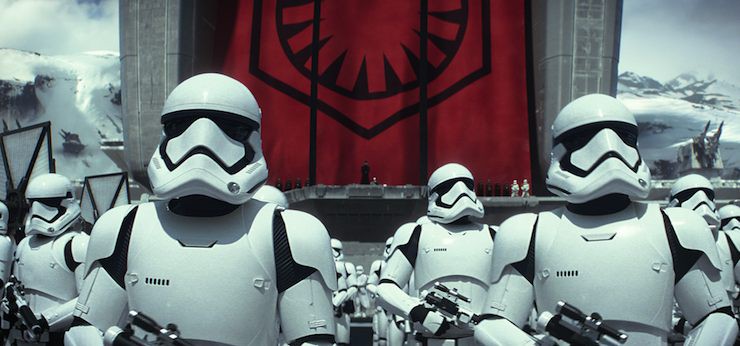
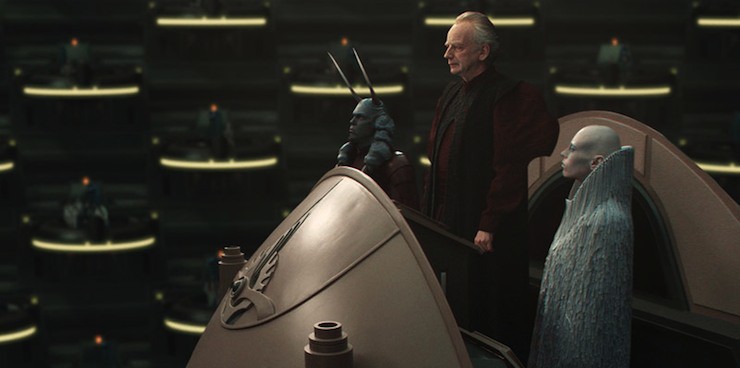
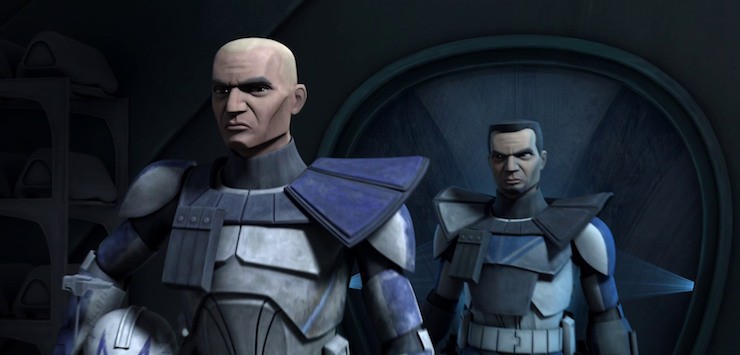
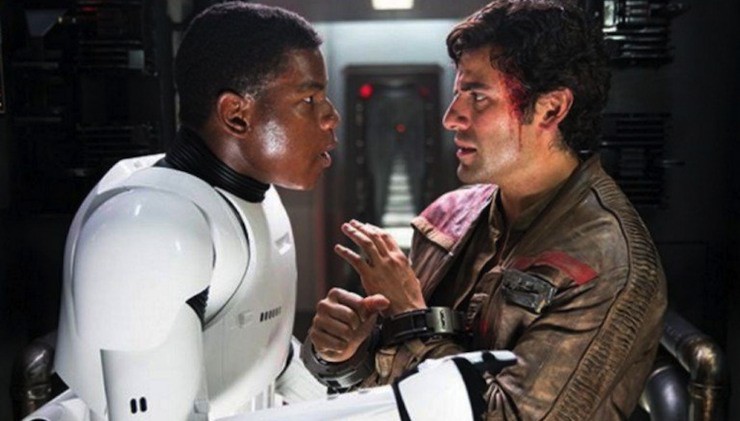
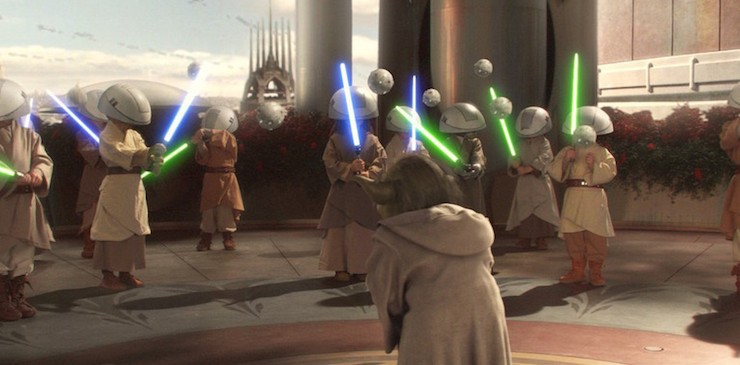

Love this article. I definitely had the same ‘wait a sec – this is basically what the Jedi were doing, and that’s an interesting parallel’ thought as soon as Finn said he was taken as a baby. I haven’t read any of the tie in fiction, and I haven’t been able to bring myself to watch the movie again, but – do we know for sure that the babies are kidnapped, or is it possible that they are orphans, given up (perhaps due to pressure put on poor families, etc), or just the offspring of people loyal to the First Order/Imperial Remnant? After all, even on earth, there are cultures who wouldn’t see much amiss with providing their offspring to a higher cause; even things like giving babies to monasteries, etc is a thing that has happened. Not that I think this is a good thing, unless you definitely can’t care for the child (and assuming the child still has some say in their vocation).
As for the clones – In the Legend canon, Karen Traviss’s Republic Commando books are really, really good in terms of their exploration of the personhood of the clones and the ethics (or lack thereof) of using them, and what that implies for the Jedi. I was really skeptical about them at first (oh boy, another book cashing in on a video game) but they are among my favorites. A lot of her Mandalorian lore has been axed, I think (even before TFA) and she’s got a pretty low view of the Jedi, but I think the books are solid.
But as an Emperor, he just plain old recruited. For an academy.
Wasn’t there forced conscription going on as well? Or is this from the Nu EU
but we have to assume that they exist somewhere
Why do we have to assume that? We’ve seen how callous this universe is to the idea of droid rights, I can see most people considering clones to be one step up from droids.
allowed for the family to decide whether or not to give up their child
Really? Because I’ve never seen that either.
Good article. Has anyone ever noticed that one of Palpatine’s aides appears to be a Thern?
Interesting correlation with the Jedi. I’m interested to see what new EU material comes up to fill in these gaps.
(It gives me a sad when the canon refers to “the Old Republic” as just the Republic that fell, when there’s actually an Old Republic Era that’s technically not canon but also has a lot of my favorite stories and characters. Old Republic Era Empire and Republic were pretty similar to one another, just with a lot more Force users on either side, and the wars more pronounced because they took place over different stories.)
@2 – I think in one of the Clone Wars episodes there is an implication that it’s a choice (and also that the children stayed with the parents for awhile). I’ve definitely read EU books where it was implied that it was NOT a choice (I believe it was Darth Maul: Shadow Hunter where one of the characters was a clerk and was resentful that he was forced to give up his son) but even before the ‘everything going forward is now consistent’ thing with the new movies, the show always trumped the books and didn’t bother to be beholden to it.
I can’t recall if there is a specific ‘canon’ source that definitively says one way or the other, but I’m willing to give the benefit of the doubt and assume that the Jedi/Republic (which must have sanctioned whatever they were doing) weren’t COMPLETE assholes. Of course, I certainly would not put it past unethical Jedi to um…persuade…the parents in less than kosher ways.
@3 That’s Sly Moore and she’s an Umbaran. Obviously ;)
@6, it seems you are correct. There goes my fanfic :)
Hux’s father created the First Order system, in the phenomenal Rebels tie-in series Servants of the Empire.
Nice rundown, and the fact that the New Order sorta swiped the Jedi Order’s recruitment method gives me a hint that Snoke might be a failed Jedi of sorts…
“That the Republic’s clone army is a deeply unethical exercise should be obvious to everyone.”
Because the armies of sentient droids aren’t unethical? I can’t think of any meaningful difference between the way they were treated: in both cases, they are sentient killing machines that are built to obey orders. So at least, the Senate’s reaction is coherent. No matter how you cut it, a world that has achieved true AI should be done with war altogether, or it immediately becomes hell (although I liked the way it was handed in Battlestar Galactica).